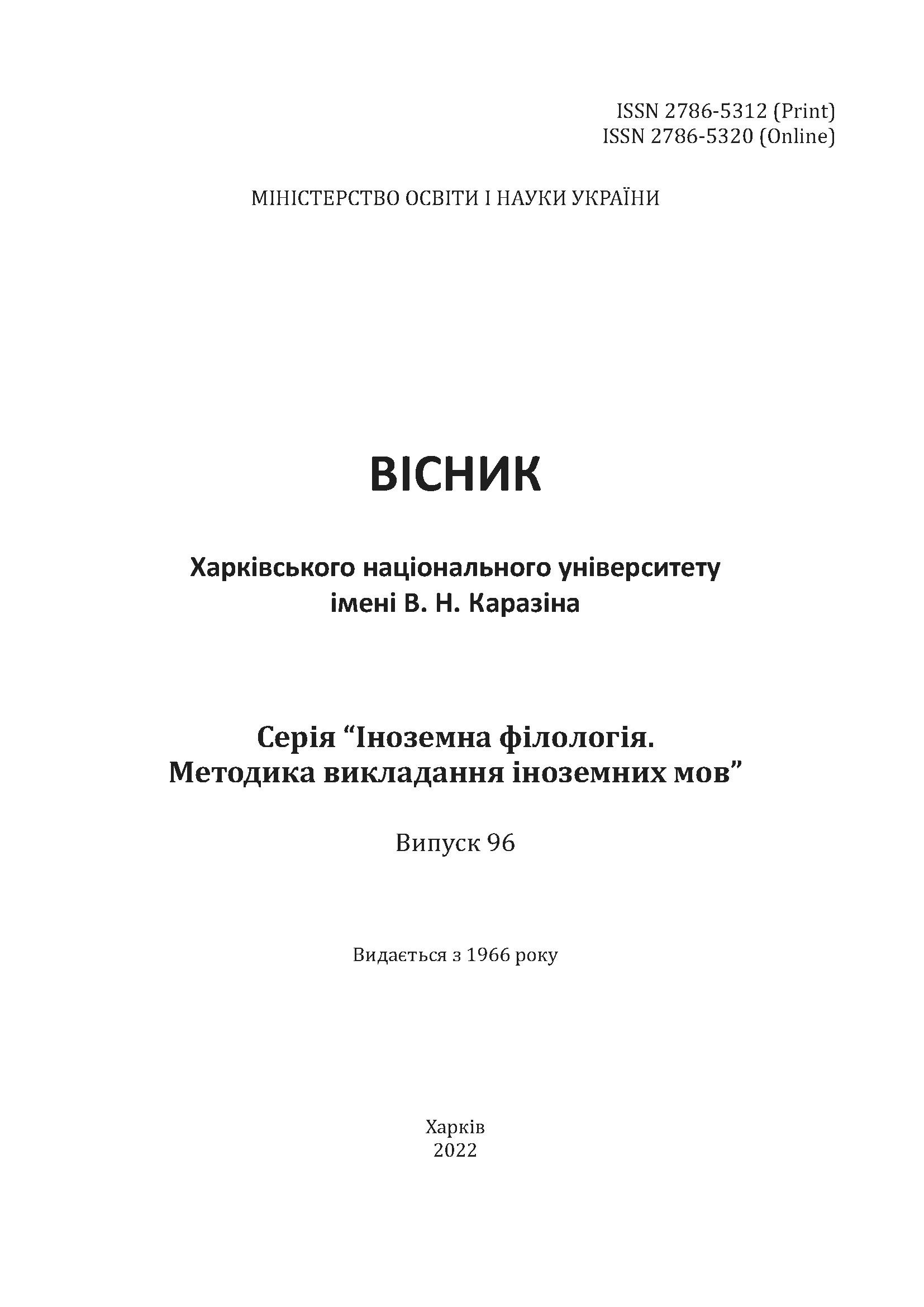Profanity in English-Ukrainian translation: creativity vs censorship
Abstract
This article rethinks the rendering of profanity from a cultural translation perspective. Profanity is broadly recognised as one of translation problems but its study has been mostly concentrated on language issues, namely stylistic ones. When viewed in terms of linguistic analysis, profanity is described as low words including argot, slang, jargon, etc. In terms of translation studies these language units are characterized as limited in usage non-normative ones, marked both culturally and emotively and coming in three varieties: abusive, socially and territory conditioned lexis. This study concentrates on the Ukrainian translation of J. D. Salinger’s novel The Catcher in the Rye, which naturally limits profanity to the first two varieties. The methodological underpinning of the research brings into the fore the interdependence and interconnections between translator’s creativity and his ideological stance restricted by censorship. The first edition of the Ukrainian translation by O. Logvynenko was published back in 1984 and it was a fully valued one, judging from a number of republications and Ukrainian readers’ high response.
The translator’s mastery however needs consideration in the social-political context of his activity. The censorship limitations in the Soviet Union of the early 1980-s, though not as strict as they used to be earlier, were still there and included among others the requirement to regard the Russian translation made several decades before as the example to follow. In his obvious willingness to render profanity as an important distinctive feature of the hero’s psychological state, O. Logvynenko had to take it into account. He rendered profanity of the source text in about a half of all the fragments of the target text employing full or partial (functional) equivalents which allowed to preserve emotive connotations. In other cases that constitute a little more than a half of all under study, he sometimes resorted to compensation which had the same effect. Still, in a number of target text fragments emotive connotations are lost as profanity is substituted with normative language units or omitted. A glance into the nature of such cases brings us to the conclusion that they were caused not by the lack of translation decisions but by ideological considerations, namely censorship constraints.
Downloads
References
Al’oshyna M. Metodolohiia “kul’turnoho povorotu” v suchasnomu perekladoznavstva ta problemy adekvatnosti v perekladi [Methodology of “Cultural turn” in modern translation studies and problems of adequacy in translation]. Retrieved from: https://pa.journal.kspu.edu/indekh.php/pa/artitsle/viev/149. (in Ukrainian).
Andrieieva, V., & Frolova, I. (2015). Osoblyvosti anhlo-ukrains’koho perekladu stylistychno znyzhenykh leksychnykh odynyts’ (na materiali perekladiv romanu “Nad prirvoiu u zhyti”) [Specifics of English-Ukrainian Translation of Low Words (based on the translations of the novel “The Catcher in the Rye”)]. In Statu Nascendi: teoretychni ta prahmatychni problemy perekladoznavstva: zbirnyk students’kykh statej [In Statu Nascendi: theoretical and pragmatic problems of translation studies: collection of students’ articles], 16, 8–14. (in Ukrainian).
Zorivchak, R. P. (1983). Frazeolohichna odynytsia iak perekladoznavcha katehoriia: na materiali perekladiv tvoriv ukrains’koi literatury anhlijs’koiu movoiu [Phraseological unit as a translation category (on the material of translations of Ukrainian literature into English]. L’viv: Vyscha shkola Publ. (in Ukrainian).
Karaban, V. I. (2002). Pereklad anhlijs’koi naukovoi i tekhnichnoi literatury: hramatychni trudnoschi, leksychni, terminolohichni ta zhanrovo-stylistychni problemy [Translation of English scientific and technical literature. Grammatical difficulties, lexical, terminological and genre-stylistic problems]. Vinnytsia: Nova knyha Publ. (in Ukrainian).
Kveselevich, D. I. (1983). Integracija slovosochetanija v sovremennom anglijskom jazyke [The integration of word combination in modern English]. Kiev: Vishha shkola Publ. (in Russian).
Korunets’, I. V. (2001). Teoriia i praktyka perekladu (aspektnyj pereklad) [Theory and practice of translation (aspect translation)]. Vinnytsia: Nova knyha Publ.
Oleksa Lohvynenko. Retrieved from: https://www.wikiwand.com/uk/%D0%9B%D0%BE%D0%B3%D0%B2%D0%B8%D0%BD%D0%B5%D0%BD%D0%BA%D0%BE_%D0%9E%D0%BB%D0%B5%D0%BA%D1%81%D1%96%D0%B9_%D0%9F%D0%BE%D1%82%D0%B0%D0%BF%D0%BE%D0%B2%D0%B8%D1%87
Rebrij, O. V. (2012). Suchasni kontseptsii tvorchosti u perekladi: monohrafiia [Modern conceptions of creativity in translation: monograph]. Kharkiv: KhNU imeni V. N. Karazina Publ. (in Ukrainian)
Selindzher, D. D. Nad prirvoiu u zhyti : per. z anhl. O. Lohvinenko [The Catcher in the Rye : translated from English by O. Lohvynenko]. Retrieved from: http://www.ae-lib.org.ua/salinger/Texts/TheCatcherInTheRye-ua.htm.
Tkachivs’ka, M. R. (2021). Kul’turno-emotyvni zakonomirnosti vidtvorennia leksyky obmezhenoho vzhytku v ukrains’ko-nimets’komu khudozhn’omu perekladi [Cultural-Emotional Regularities of Rendering Lexis of Limited Usage in Ukrainian-German Fiction Translation] (Philology Doctorate thesis synopsis). Kharkivs’kyj natsionalnyj universytet imeni V. N. Karazina, Kharkiv. (in Ukrainian)
Frolova, I. Ye., & Lapina, O. V. Chynnyky ideolohichnoho vplyvu na pereklad (na materiali ukrains’kykh perekladiv romanu E. Hemingveia “Po komu podzvin” 1981 ta 2018 rr.) [The factors of ideological influence on translation (based on Ukrainian translations of E. Hemingway’s novel “For Whom the Bell Tolls” in 1981 and 2018)]. Visnyk Kharkivs’koho natsional’noho universytetu imeni V. N. Karazina. Seriia: Inozemna filolohiia. Metodyka vykladannia inozemnykh mov [The journal of V. N. Karazin Kharkiv National University. Series: Foreign Philology. Methods of Foreign Language Teaching], 94, 40–46.
Shvydchenko, A. V. (2012). Slova-parazyty v suchasnomu molodizhnomu slenhu [Junk words in modern youth slang]. Visnyk Dnipropetrovs’koho universytetu imeni Al’freda Nobelia. Seriia “Filolohichni nauky” [Bulletin of Alfred Nobel Dnipropetrovsk University. Series “Philology”], 2(4), 192–194.
Bassnett, S., & Lefevere, A. (1990). Translation, History and Culture. London: Printer Publishers.
Cambridge Dictionaries Online. Retrieved from: http://dictionary.cambridge.org
English-Ukrainian Dictionary. Retrieved from: http://www.englishukrainiandictionary.com/en/dictionary-english-ukrainian
Johnson, R. (2013). If Holden Caulfield Spoke Russian. Retrieved from: https://www.newyorker.com/books/page-turner/if-holden-caulfield-spoke-russian
Longman English Dictionary Online. Retrieved from: http://www.ldoceonline.com
Merkle, D. (2010). Censorship. Handbook of Translation Studies (Vol. 1, pp. 18–21). Amsterdam, The Netherlands: John Benjamin Publishing Company.
Salinger J. D. The Catcher in the Rye. Retrieved from: http://www.readanybook.com/online/20556




